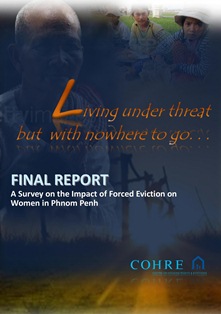Resource information
You can find below, attached, a new report from the Centre On Housing Rights & Evictions (COHRE) - Asia on women's land and housing rights in Phnom Penh. Authors identify 11 recommendations for the Royal Government of Cambodia and 7 for NGOs. The report is based on a survey of 742 women interviewed, representing approxitemely 10 percent of the affected families in 74 communities threatened with forced evictions in Phnom Penh.
As affirmed by the authors, "random selection and interviews were conducted with the assistance of some community leaders or village chiefs. Information from local NGOs, including the Housing Rights Task Force (HRTF) network members working on housing and land rights issues, was used in randomly selecting the communities. The communities selected are spread across 11 different types of location. [...] Subsequently, COHRE employed six Khmer field interviewers, who underwent a two-week orientation and survey preparation prior to field deployment. [...] The six field interviewers were organized into two teams to conduct interviews of 10 women for each community for a period of 2½ months" (P. 7).
Below, an excerpt of the Preface:
"Forced evictions in Phnom Penh are emblematic of the housing and land rights issues in Cambodia as a whole, although the negative impacts have disproportionate consequences on women. This Report is a contribution by the Center on Housing Rights and Evictions (COHRE) which examines the specific impact on urban poor women at the different stages of forced eviction. The Report also examines the compounding impact of domestic violence inflicted on women respondents who either face the risk of being evicted or have already been evicted from their land.
On this premise, specific recommendations have been formulated to address the concerns identified by the women respondents and are addressed to the Royal Government of Cambodia (the RGC) and the non-governmental organizations (NGOs) lending support to women’s rights and housing rights advocacy. The recommendations are in effect directed at addressing the de jure (in law) and de facto (in practice) rights of women to adequate housing as enshrined under domestic law as well as international human rights laws and covenants. The national laws of Cambodia guarantee the right to security of tenure for all, including affected women and their families, and yet the practice of forced evictions undermines all these guarantees and violates the fundamental rights of women to live in dignity.
It is hoped that through this Report, the RGC and NGOs will find our recommendations to be worthy and complimentary of their efforts and resources in ensuring the rights of women to security of tenure and in combating violence against women."

